1941.
Private Robert E. Lee Prewitt (Montgomery Clift) arrives at a military base in Hawaii and presents himself before the commanding officer, Captain Dana Holmes (Philip Ober). The captain is a boxing enthusiast, and he’s licking his lips at the thought of having added one of the army’s best boxers to his clutch: Prewitt is a famous middle-weight, isn’t he. No sir, Prewitt says. He was; he doesn’t fight now. Not after that incident—Holmes obviously knows what Prewitt’s alluding to, but we get to know only later, when Prewitt meets and falls in love with a prostitute named Lorene (Donna Reed).
To Lorene, Prewitt recounts what happened. How he and his sparring partner, who was also his best buddy, were boxing. And how a punch from Prewitt hit his friend, and ended up blinding him and sending him into a coma from which he never recovered.
As Montgomery Clift says this dialogue, you see a moment when the ace boxer that he was surfaces: he recounts that punch, the way his fist lifted. There is momentary exultation in his face, his expression lights up in triumph and there is, briefly, excitement in his voice—and then, in almost the same moment, he remembers what happened. He remembers his friend going blind and comatose: he remembers his pal dying.
Instantly, Prewitt slides into shock, reliving the horror and guilt. His voice cracks as he tells Lorene of his friend’s death, and how it led to him never boxing again.
It’s a memorable scene, at least for me. Not because of the content (which is important enough for the plot), but for Clift’s acting. He is so believable, the emotion so deep, the moment of remembered triumph so natural, yet the guilt that follows immediately after so true too.
Today is the birth centenary of Montgomery Clift: he was born on October 17, 1920, in Omaha, Nebraska. Often regarded as one of the rare leading men who was both handsome as well as a good actor (Marlon Brando was often clubbed with Clift in this respect), ‘Monty’ had a tragically short life, plagued with chronic physical problems, and having to constantly project himself as the heterosexual he was not. In 1956, Clift was involved in a car crash that resulted in him having to undergo extensive surgery to rebuild his face; while he continued to get some good roles (his superb acting in Judgment at Nuremberg, 1961, got him an Oscar nomination), Clift’s most memorable films were behind him. He died tragically young, too: before he turned 46.
In commemoration of Montgomery Clift’s birth centenary, therefore, a review of one of his best films, a film that is worth watching even otherwise. From Here to Eternity, a film much lauded and awarded, and considered one of the best American drama films ever written.
To continue from that introduction to Prewitt and his character: Prewitt’s outright refusal to box for his company gets Holmes’s goat. He considers this insubordination, and immediately gives orders for Prewitt to be subjected to the ‘treatment’. Which basically means that Prewitt is singled out, again and again: the rest of the company is dismissed, he must continue with the drill. The rest crawl through grass, he crawls through the muddiest, wettest patch—and has muddy water splashed up into his face from the sergeant’s deliberately stamping boots too.
Prewitt isn’t utterly alone; there are people who sympathize. There is, for instance, his old friend Angelo Maggio (Frank Sinatra), who’s known Prewitt from before, and who stands up for him.
There’s not much Maggio can do, but he is friendly, and he is the one who takes Prewitt into town for a night’s dancing and entertainment at the New Congress Club, and that is where Prewitt first meets Lorene. There is instant attraction between them, and he ends up telling her about himself, and why he’s at the receiving end of so much flak from Holmes and the rest of the boxers of the company.
Among the others who see the injustice of the treatment meted out to Prewitt is Sgt Milton Warden (Burt Lancaster), Holmes’s aide. Warden goes along, to some extent, with all that Holmes orders him to do, but he seems to have an inherent dislike of Holmes…
… which perhaps is fueled by the fact that he knows some of the more unsavoury aspects of Holmes’s character. Not that Holmes hides his vices, but still: Warden discovers just how vile Holmes is, because Holmes’s wife, Karen (Deborah Kerr) tells Warden so. Warden is attracted to her, and they begin an affair which seems to a disillusioned Warden to be only the latest in a string of affairs, until Karen tells him the truth behind the wreck of her marriage. Holmes is even viler than Warden had imagined.
This, therefore, is the scenario. Warden is having an affair with Holmes’s wife—not just a fleeting, hectic bit of lustful romping either; they are falling in love, seriously.
And at the same time, a vindictive Holmes has become intent on ruining Prewitt. He doesn’t even care that he is likely to deprive the company of a good boxer; all he wants is to crush Prewitt.
That is what forms the core of what this story snowballs into. Holmes’s obsession with getting Prewitt to box is transmitted down the line to others in the pecking order, and Prewitt swiftly begins to find himself attacked on all sides. Maggio, when he tries to take Prewitt’s side (and then his own, too, when a sergeant sneeringly refers to him as ‘Wop’), ends up in even worse trouble.
Plus, of course, there is Sgt Warden, looking on. As Holmes’s aide, and as a man, too, who does not like what he sees.
Remember, too, that this is set in Hawaii. In 1941. The bombing of Pearl Harbor looms.
What I liked about this film:
Pretty much everything. The story, the acting, even the setting: all are excellent.
One of the most interesting elements of the story for me was the somewhat-parallel lives of the two main characters, Prewitt and Warden. Both are men of principles, and both are men who are true to their calling. Prewitt is a ‘thirty-year’ soldier, a career soldier and not a man who’s enlisted just because there’s a war on. Warden is a non-commissioned officer, and no matter what, he does not want to try to become an officer. He is prime officer material, as even Holmes says; he could easily be the type of officer the army needs: but he does not want to be one, and that is it. It may lose him everything else, even his love, but his career is more important.
Besides that, both Warden and Prewitt have complicated love lives (love lives too which clash with their careers as soldiers). Warden is the lover of his boss’s wife and there is little hope that Karen will be able to get a divorce, though she wants so much to marry Warden. Prewitt’s love, Lorene (who turns out to be staid Alma, from Oregon) refuses to marry him because she wants a ‘proper’ life back in mainland USA.
And when the climax comes, in the Japanese bombing of Pearl Harbor, it has its impact on both relationships, with career and with woman, of both these men.
Another interesting element of the story I especially liked was the recurring motif of the bugle (or, sometimes, its mouthpiece). Prewitt’s role as a bugler, even if it was only in the past, resurfaces every now and then, and at some of the most dramatic and touching moments of the film, underlining the many aspects of this young man. That last bit of bugling, with a borrowed bugle, played on the mic for the entire camp to hear, brought a lump to my throat.
A poignant story and a somewhat shocking one about the brutality and injustice that proliferates in the army.
What I didn’t like:
A minor point, and I appreciate that this is probably more a reflection of how things were in reality rather than what the writer or filmmaker wanted it to be: the lack of agency of Karen. Given that her marriage is a wreck and that Holmes is a creep of the first order, her helplessness about getting out of this marriage irritated me. Of course, it could have been that she has nothing and nobody else to fall back upon (though she seems educated, and might have got a job? And did she have no friends or family of her own, no siblings or any other people she might reach out to for help?), but there is no indication of this. Why does she not show some spine?
Overall, though, that’s a minor grouse. This is a good film, worth all the many awards it won (including eight Oscars). Plus, it’s an excellent showcase of the talent of Montgomery Clift. Watch it for him, if for nothing else.




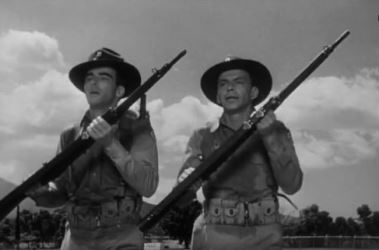
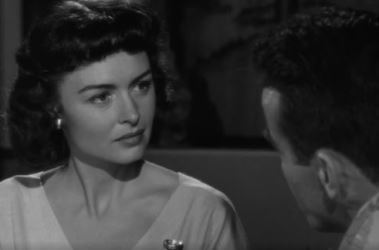
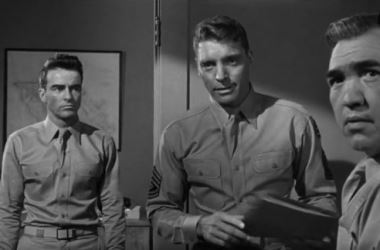
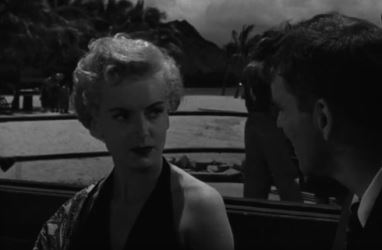
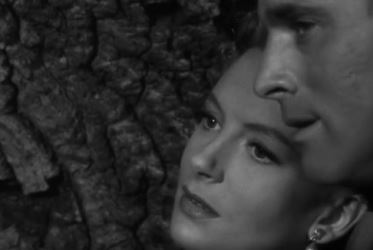
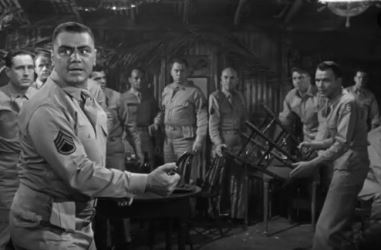
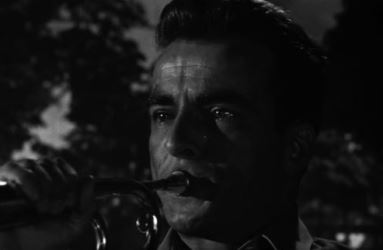
Did you forget the jump break? :)
Love this film to bits, Madhu, and thank you for your wonderful review that brought it all back to memory.
Re: Karen – remember this is 1940-41. Plus, not much has changed for victims in an abusive marriage. I think it is not something we can understand unless we go through it – why women (and men) stay on in abusive relationships. Besides, Holmes is vindictive enough to kill her if she walks out.
What seems like a lack of spine is a beaten-down woman who doesn’t even trust herself, much less anyone else. My two paise. :)
LikeLike
“Did you forget the jump break? :)”
Thank you for drawing that to my attention, Anu! Have fixed that, but it gives me an opportunity to vent about WordPress. ;-) They’ve just introduced a new editor which is horrible. Very complicated, and so many things that were easily done with one click earlier now need lots of clicks to accomplish – and since I still don’t know it well, I end up having to try to figure it out again every time I publish a new post,and sometimes, in the process, I forget to do certain bits.
Arrgh. Anyway, rant over.
I think re: Karen, it’s less 1940-41 (after all, this was also the age of Rosie the Riveter), and more that of a woman in an abusive marriage who doesn’t know how to get out of it on her own. And, as you mention, doesn’t trust herself to do it. I guess without the emotional support (if not the physical and financial) of a man like Warden, she can’t imagine leaving Holmes, no matter how vile he is.
LikeLike
They’ve just introduced a new editor which is horrible. Very complicated, and so many things that were easily done with one click earlier now need lots of clicks to accomplish
Ohhhh…. tell me about it! Blogger has ‘updated’ its platform too and now it’s less intuitive. And I’m damned if I can find anything I need to format the post. Since young A does it for me, and I have to explain it to him, it leads to some shared frustration, I wonder how long he’ll put up with it before he says ‘To hell with your blog!” :(
LikeLike
“And I’m damned if I can find anything I need to format the post.”
Exactly! I really wonder how many bloggers need such a complicated editor. Most of the blogs I frequent are so basic that I don’t see their admins needing something so high-falutin’. :-(
LikeLike
Madhu,
This is my favourite war film, not so much for the war, but for the characters, and the way harsh, unfair side of ‘command’ and ‘hierarchy’ has been depicted But what has stuck in me since the last time I saw it ages ago is a dialogue of the ‘renegade’ who comes back to the unit, which had thrown him out, in the hour of crisis. When asked by his girlfriend why he has to go back (no one asked him to), he replies: “Because I am a soldier.” That redeems him and also redeems soldiering.
AK
LikeLike
Yes, that dialogue is a memorable one.
Talking of the unfairness of hierarchy and the chain of command, have you seen Kubrick’s Paths of Glory? Another superb film.
LikeLiked by 1 person
Madhu,
‘Paths of Glory’ is another absolute favourite. Fortunately, one of the movie channels showed it regularly a few months back, and I got to refresh my memory. The film is uplifting for the honourable conduct of the hero, Kirk Douglas, but a film’s greatness also lies in how negative characters are shown, and you have the whole lot – from ruthless, sadistic, to cynical, manipulative. And the way they discuss numbers for compromise! Unfortunately, this film had no redemption, but in WW 1 the generals really had this kind of inhuman notion about ‘cowardice in the face of enemy’. Many glorified generals at the time are now viewed very adversely.
AK
LikeLiked by 1 person
It’s a favourite of mine too, a superb movie. I must watch it again one of these days. And while it does show no redemption, I do agree that that is actually quite realistic – as opposed to the idealism which eventually shows through in From Here to Eternity.
LikeLiked by 1 person
One of my favorite ‘war’ films although the film is not about a war or battle but it does portray army life. I usually dislike ‘war’ movies because they’re so formulaic. I watched this movie a few years ago to see the famous love scene between Burt Lancaster and Deborah Kerr. I ended up loving the movie. The performances are wonderful. I had earlier watched Donna Reed in ‘It’s A wonderful Life’ and ‘The Donna Reed Show’ and didn’t like her too much. But she’s marvelous here. I liked Clift in Hitchcock’s ‘I Confess’ but he’s very impressive in this movie. Good review.
LikeLiked by 1 person
Your comment reminded me of something – the ‘love scenes’ between Kerr and Lancaster are probably the most famous stills from the film, aren’t they? The two of them on the beach, for instance – that was what made me think the film would be primarily about them. But that’s far from the truth; the film is much, much more. And yes, so good.
LikeLiked by 1 person